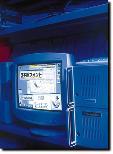
This bundling deal is believed to be the first time for a major PC manufacturer to offer Linux preinstalled on desktop computers.

In looking for international news for this column, I found one spurious rumor that Hitachi would be using Linux and one true rumor that Pacific HiTech and Panasonic were becoming partners. This is good news indeed for the Linux community in general and for the Japanese community in particular. Our cover is a Panasonic computer running Pacific HiTech's Linux in Japanese. The following information was provided by Lonn Johnston and Craig Oda of Pacific HiTech.
Panasonic, one of the world's largest consumer electronic and computer vendors, will be installing Pacific HiTech's TurboLinux operating system on high-end Panasonic desktop computers. This bundling deal is believed to be the first time for a major PC manufacturer to offer Linux preinstalled on desktop computers.
Pacific HiTech (PHT) is the largest Linux company in Japan with more than 50 percent market share. In December 1998, PHT Linux products outsold Microsoft's Windows NT in Japan, according to Japan's Computer News, an industry analyst firm.
In March, PHT will announce two high-performance Linux server products for the United States market for corporate Intranet and Internet applications. It will also announce a high-end TurboLinux product that will push Linux to new levels of mission-critical deployment. PHT will back its products in the United States with national support from one of the world's largest corporate call centers and training companies. It already has this support infrastructure well established in Japan.
Panasonic is already offering its 275,000 employees the option of ordering their computers preinstalled with TurboLinux and has quietly been shipping TurboLinux to corporate customers on Panasonic computers since December 1998. Pacific HiTech will be the exclusive supplier of the Linux operating system to Panasonic.
The TurboLinux option will be offered on Panasonic desktop computer models using Intel Pentium processors at 400 to 450MHz. While the computers will be sold under the Panasonic brand, the machines will actually be built by Proton under an OEM arrangement. Proton, one of Japan's largest desktop manufacturers, is a subsidiary of Ado Denshi, a high-technology Japanese company. The units will initially be available only in Japan.
The Pacific HiTech and Panasonic deal is a key international development, which will help drive Linux into the corporate mainstream, both in Japan and the United States. Corporate chief information officers have been deploying Linux in selected applications for several years but have been reluctant to embrace the upstart operating system throughout the information technology infrastructure until support and other mission-critical issues have been resolved. By bundling TurboLinux in volume preinstalled desktop machines, Panasonic is addressing many of those issues and bringing credibility to Linux as a viable corporate operating system for the desktop, Internet and Intranet, as well as mission-critical applications.
Pacific HiTech has a long list of software, hardware and distribution partnership agreements with leading companies around the world, including Oracle, Adaptec, Accton, Panasonic, Corel and DDI, Japan's second largest telephone company.
PHT invests significant development resources in its TurboLinux product suite to simplify installation and offer the most stable, robust and powerful Linux operating system on the market. PHT believes customers are better served by Linux as an operating system of choice if they also receive commercial software bundled with Linux. By offering Oracle bundled with TurboLinux, for example, customers gain many benefits: easier installation, performance improvements and one-stop support.
TurboLinux was chosen by Panasonic not just for its technological advantages and Pacific HiTech's support infrastructure, but also for its programming design that easily accommodates languages other than English. TurboLinux is available in three languages: English, Japanese and Chinese (more versions to be announced). While most systems administrators around the world have adopted English as the Lingua Franca of computing, there are major advantages in administering systems using one's native language. For less technical computing audiences, vendors have no choice but to offer local language support. TurboLinux easily accommodates different languages from installation and graphical user interface all the way through to network administration tools. It is a customer-friendly approach consistent with Linux as an international operating system.